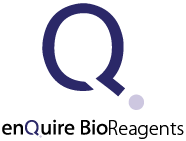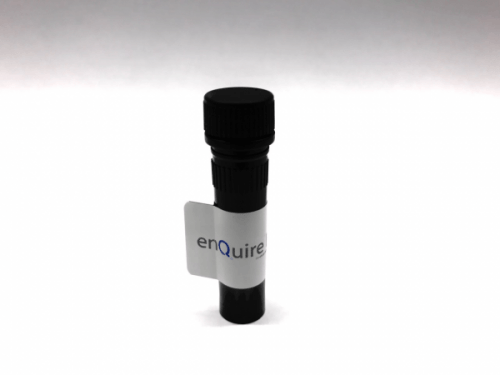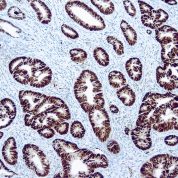Antibody (Suitable for clinical applications)
Sample Type: FFPE Patient Samples.
Tested Applications: IHC. Approved for In Vitro Diagnostic Procedures on FFPE tissues. For tissue collection recommendations, please see datasheet sent with product.
Application Notes
| Specification | Recommendation |
|---|---|
| Recommended Dilution (Conc) | 1:50-1:100 |
| Pretreatment | EDTA Buffer pH 8.0 |
| Incubation Parameters | 30 min at Room Temperature |
Prior to use, inspect vial for the presence of any precipitate or other unusual physical properties. These can indicate that the antibody has degraded and is no longer suitable for patient samples. Please run positive and negative controls simultaneously with all patient samples to account and control for errors in laboratory procedure. Use of methods or materials not recommended by enQuire Bio including change to dilution range and detection system should be routinely validated by the user.
Clonality: Monoclonal
Anti-p53 Antibody Clone: EP9
Host and Isotype: Rabbit Rabbit IgG
Recommended Positive Control Sample: Colon Cancer
Cellular Localization of Antibody EP9 Staining: Nuclear
Buffer and Stabilizer: PBS with 1% BSA and 0.05% NaN3
Antibody Concentration: Lot specific. Plese contact tech support for data.
Immunogen: A synthetic peptide corresponding to N-terminal residues of human p53protein.
Storage Conditions: This antibody should be stored refrigerated (2-8°C). This product should not be used past the expiration date printed on the vial.
p53 Information for Pathologists
Summary:
Tumor suppressor gene at 17p13, 53 kDa. p53 ensures that cells repair any damaged DNA before cell division by inducing cell cycle arrest to allow time for:. DNA repair OR. To force the cell to undergo apoptosis via activation of bax gene (J Biomed Biotechnol 2011;2011:603925, Wikipedia - p53). Mutations are among most commonly detected genetic abnormalities in human neoplasia; however, presence of p53 mutation is usually not, by itself, specific enough for a diagnosis for malignancy, and its absence does not rule out malignancy.Common Uses By Pathologists:
Differentiate malignant conditions, which are often p53+ (carcinoma in situ of urothelium and other sites, invasive carcinoma) from reactive and metaplastic conditions which are usually p53- (Am J Surg Pathol 2001;25:1074). May be useful to distinguish uterine serous carcinoma (p53+) from endometrioid carcinoma (usually p53-). May be useful as serum tumor marker (Arch Pathol Lab Med 2011;135:1570). Microscopic (histologic) images Images hosted on PathOut server:.Limitations and Warranty
This antibody is manufactured in accordance with clinical good manufacturing practices in an ISO13485:2016 certified production facility. It is intended for multiple uses including in vitro diagnostic use and research use only applications. Please see vial label for expiration date. We strive to always deliver antibodies with a shelf life of at least two years.







There are no reviews yet.